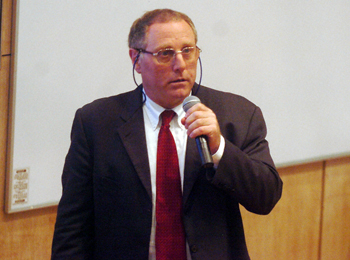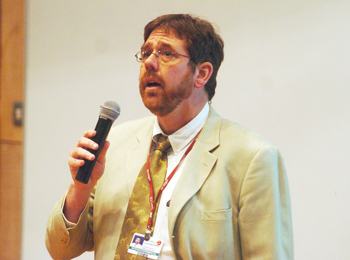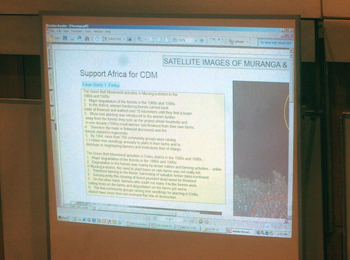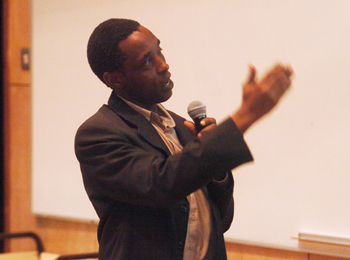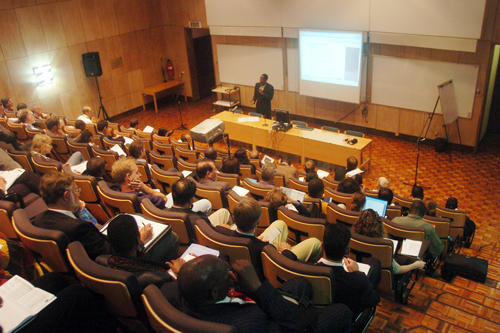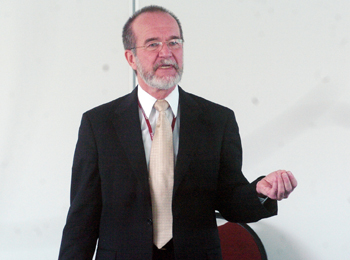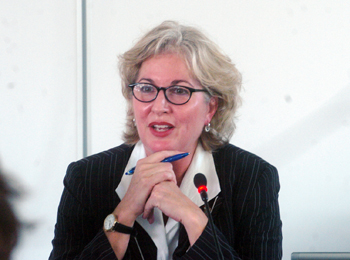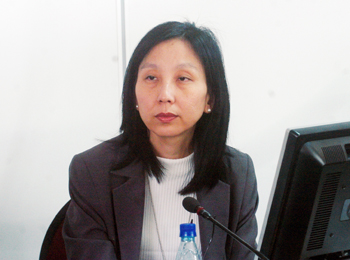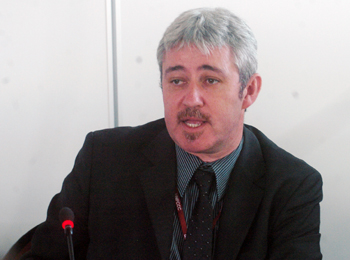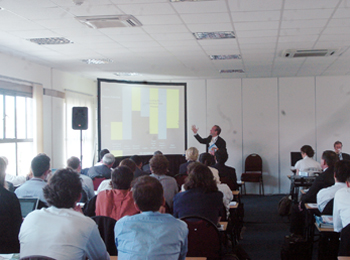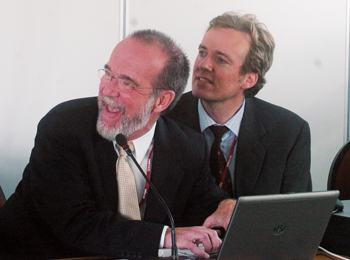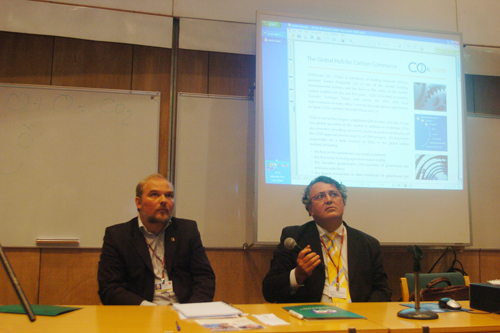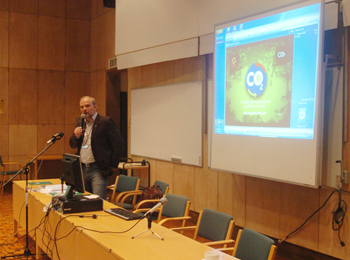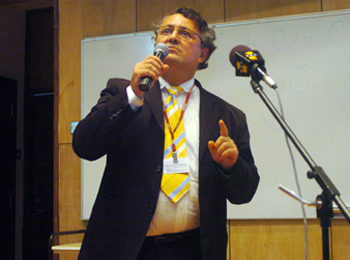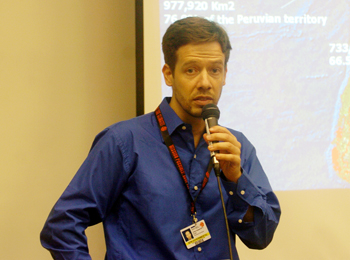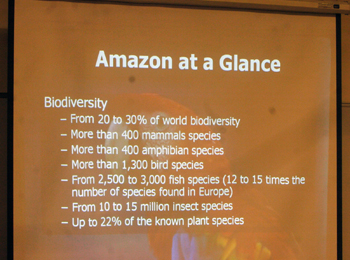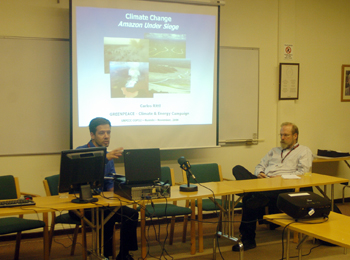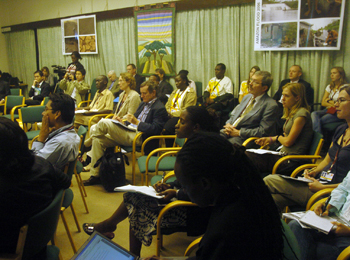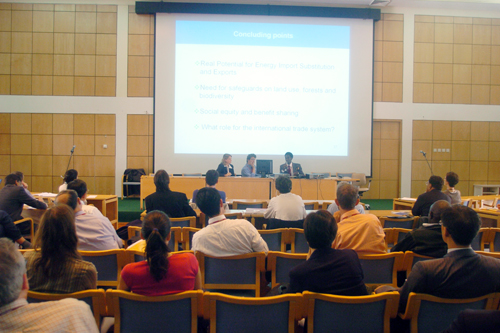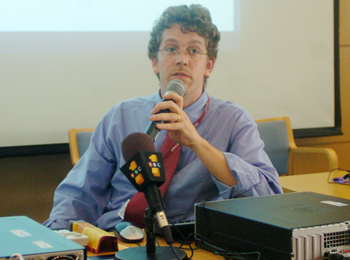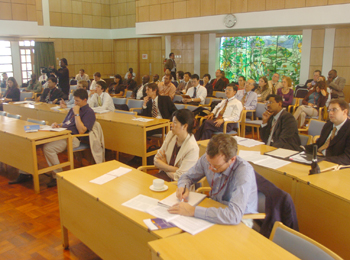 |
||
|
Published by the International Institute for Sustainable Development (IISD)
|
|||
|
A Special Report on Selected Side Events at the Second Conference of the Parties serving as the Meeting of Parties to the Kyoto Protocol (COP/MOP 2) and Twelfth Conference of the Parties (COP 12) to the UN Framework Convention on Climate Change (UNFCCC)
|
|||||
| 6-17 November 2006 | Nairobi, Kenya | |||||
 |
|||
 |
|||
Events convened on Monday, 6 November 2006
|
Smallholder carbon development projects: linking climate change mitigation with poverty reduction Presented by ICRAF |
|||||
|
Louis Verchot, World Agroforestry Centre (ICRAF), explained that Clean Development Mechanism (CDM) projects should generate concrete development and environmental benefits in host countries and that these benefits should be distributed equitably across countries. Stating that smallholder land use and land-use change and forestry (LULUCF) projects can allow some of the poorest people in the world’s poorest countries to enter the carbon market, he lamented that many bottlenecks currently hinder this possibility. Njogu Kahare, Green Belt Movement, highlighted the potential of CDM-supported reforestation projects on gazetted forests, farms and public lands in Kenya. He emphasized that communities need support to simultaneously increase tree cover in farm areas and regenerate forests. Highlighting a pilot CDM project with support from the World Bank, he stressed that the current price of carbon is inadequate to make such projects viable. Jonathan Haskett, ICRAF, stated that CDM rules need to change to increase participation of, and benefits to, the world’s poorest countries, particularly in sub-Saharan Africa. He suggested changes, including: removal of the 1% restriction on Annex 1 countries’ use of LULUCF and increasing the small-scale project limit for LULUCF projects from 8,000 tons to 60,000 tons. He stressed that LULUCF project types should expand beyond afforestation and reforestation projects. Keith Shepherd, ICRAF, explained that lack of accurate, cost-effective methods for measuring and monitoring carbon stocks over large areas has been a major impediment to smallholder carbon development projects. He highlighted a range of new tools to overcome this bottleneck. Adam Tuller, Africa Conservation Trust (ACT), introduced the Rural Transformation Scheme, an ACT initiative that seeks to increase tree cover in Kenya while simultaneously addressing water security and livelihood issues. He highlighted the difficulties in adapting CDM to the ‘practical requirements’ of Africa as well as the need to extend the crediting period to at least 25 years. Participants discussed, inter alia, the tensions that can exist in creating pro-poor carbon projects and the differences between large-scale commercial plantations and small-scale LULUCF projects. |
|||||
|
|||
|
Preparing technology transfer projects for financing Presented by UNFCCC |
|||
|
Bernard Mazijn, Expert Group on Technology Transfer (EGTT) Chair, introduced the event, noting that technology transfer and financing will be at the heart of negotiations.
Wanna Tanunchaiwatana, United Nations Framework Convention on Climate Change (UNFCCC), underscored the technology transfer and existing opportunities under the UNFCCC. She noted the key themes to promote technology transfer are elaborating countries’ technology needs assessment (TNAs), having access to technology information, and enabling activities and funding. Margaret Martin, EGTT member, summarized EGTT work in the area of innovative financing, including the Montreal and Bonn Workshops organized in collaboration with the private sector. She underscored that the workshops concluded that there are considerable financial resources available for projects but many projects are poorly elaborated and unable to attract investment. Philip LaRocco, E+CO Energy Through Enterprise, outlined the UNFCCC “Preparing and presenting proposals: Guidebook on preparing technology transfer projects for financing” and highlighted key elements of a proposal, including: the core concept (product, service, client and technology), the setting (location and market), the team, the implementation plans, expectations, contingencies and the audience. Emma Staub, E+CO Energy Through Enterprise Africa, described examples of technology transfer projects in Africa, including a solar water heater for large institutions in South Africa and a solar energy projetct in Tanzania. She outlined the short and long-term benefits of such projects, including: access to cheaper energy and heated water to communities; creation of jobs; and reduction of greenhouse gas (GHG) emissions. Thomas Verheye, EGTT member, presented the new initiative of the European Commission of the Global Energy Efficiency and Renewable Energy Fund (GEEREF) of € 100 million. He explained the fund is based on risk capital or equity and stressed that GEEREF will fund projects on biomass, wind, hydro, solar and geothermal, utility based and distributed generation, biofuel, manufacturing, energy service, trading microfinance ventures and energy efficiency. |
|||
|
|||
|
CARE Brasil Social Carbon Fund - Carbon credits: from preserving the environment towards alleviating poverty Presented by Ecologica Institute |
|||||
|
Markus Erwin Brose, CARE Brasil Social Carbon Fund, launched the CARE Brasil Social Carbon Fund, a partnership between CARE Brasil, an NGO that focuses on alleviating poverty worldwide and CO2e.com, a private company with carbon market expertise. He underscored this initiative will provide new funds for small-scale projects on biofuels, landfills and afforestation and reforestation. Brose announced that the fund aims to attract a variety of investors, including those who need to comply with carbon targets or would like to promote social responsibility.
Divaldo Rezende, CO2e.com, noted CO2e.com delivers market-based solutions to help companies address climate change issues, including: brokerage services related to GHG, renewable energy and other environmental products; and sourcing and delivery of emission offsets. Noting there is no LULUCF project in Brazil, he underscored the fund aims at integrating local communities in CDM projects and changing the reality of poor communities in a sustainable manner. Stressing that the fund will become operative in the next three months, Rezende said investors will receive back Certified Emission Reductions (CERs), which can be sold in the market or used for compliance. Discussion: Answering a participant’s enquiry, Rezende said the methodology used for identifying the social gains obtained by communities when reducing GHG emissions is based on the sustainable livelihoods approach. Another participant asked how CO2e would harmonize its brokerage activities with reducing poverty and Rezende reasoned that in the fund, selling CERs is not compulsory for the investors and not linked to brokerage activities. |
|||||
|
|
|||
|
Rivers of no return: how climate change is affecting the world’s great rivers Presented by Greenpeace International |
|||
|
Carlos Rittl, Greenpeace International, showed a documentary on the impact of climate change on Brazilian livelihoods. He pointed out that the Amazon is a powerful atmospheric regulator but that it faces numerous threats. He stressed that deforestation has increased between 2000 and 2005, with 130,000 square kilometers lost. Rittl said that land-use change is causing unprecedented impacts in the Amazon with biodiversity losses of unknown magnitude. He added that climate change has resulted in temperature increases of 0.63 degrees centigrade in the last 100 years and changed rainfall patterns.
Rittl underscored that the impacts of changed climate patterns include primary forests becoming transitory forests, threats to species, rainfall pattern changes and extreme climate events with more frequent droughts and floods. Rittl urged the Brazilian government to take immediate action to develop policies and provide resources for combating deforestation and promote the sustainable use of natural resources. He called for action at the international level towards deeper and broader cuts in the Annex 1 parties’ emissions for the second commitment period. Discussion: A participant commented that adaptation to climate change is not just an issue for Brazil but for other industrializing countries and suggested the Global Environment Facility (GEF) could design adaptation models for alternative community livelihoods. |
|||
|
|||
|
Towards a sustainable bioenergy strategy: the role of international trade Presented by ICTSD |
|||
|
Moustapha Kamal Gueye, International Centre for Trade and Sustainable Development (ICTSD), highlighted the possibility for import substitution of biofuels and their export potential, particularly for developing countries. He stated that biofuels can lead to GHG emission reductions but warned that environmental and social factors, as well as the balance between fuel and food security, must be considered.
Christophe Bellmann, ICTSD, discussed the applicability of the World Trade Organization (WTO) rules to biofuel trade, focusing on tariffs, subsidies and standards. He highlighted the relevance of the Doha negotiations on Environmental Goods and Services regarding tariffs, and noted the potential compatibility of consumer subsidies. Ancha Srinivasan, Institute for Global Environmental Strategies, said there is both interest and concern in biofuels in Asia, and cautioned that Brazil’s success with sugarcane might not be replicated elsewhere given the need to understand each country’s context. He added that many Asian countries have started putting mandatory standards in place and are looking for more biotechnology innovations. John Coequyt, Greenpeace, suggested that international pressure for Brazil to export biodiesel products will continue. He noted that the terms of employment for production of ethanol from sugarcane in Brazil are slanted in favour of large corporations. He cautioned that discussion on biofuels are complex and emphasized the need for a rigorous and sophisticated way to understand their global warming mitigation potential. Participants discussed, inter alia, the need to consider ethanol and biodiesel separately and the potential environmental risks of allowing biofuels trading, particularly without sufficient standards. |
|||
|
|||
|
||
|
Click the above button to go back to our ENB main coverage
|
||
|
|
|
|
|
||
|
